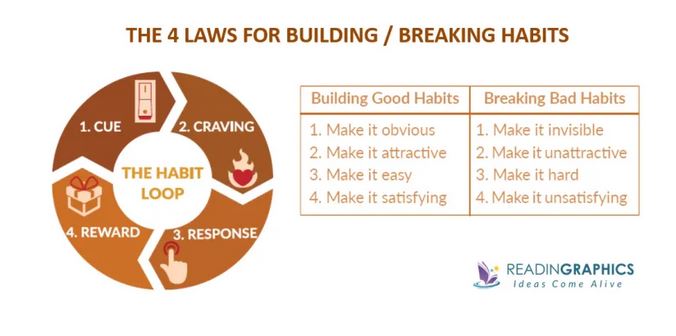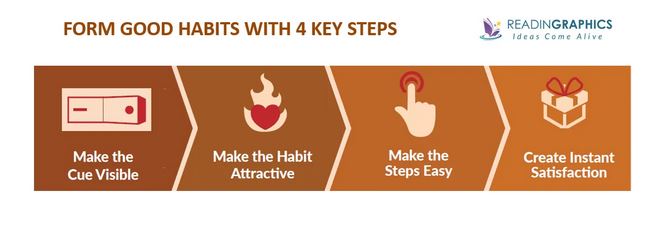Atomic Habits
Tiny Changes, Remarkable Results - Over Time
We live in a delayed return environment yet we are hardwired for instant gratification

Atomic Habits - Overview
Atomic habits are:
- The single irreducible component that when practiced regularly yield incredible results through the power of compound growth.
- Comprised of small and seemingly insignificant changes that will compound into remarkable results if you persist with them consistently over many years.
- The result of having the right system in place. Bad habits are the result of you having the wrong system in place.
The 5 Core Themes
James Clear's best selling book "Atomic Habits" identifies these 5 core themes:
- Habits are the compound interest of self-improvement.
- Forget about setting goals and focus on your system instead and you will achieve better results
- Focus on who you wish to become not on what you want to achieve. This is the most effective way to change your habits.
- "The Four Laws of Behavior Change" are the following simple rules to build better habits: [1] make it obvious [2] make it attractive [3] make it easy, and [4] make it satisfying.
- Human behavior is shaped by the the invisible hand of the environment.
Atomic Habits - Key Take Away
I have read a number of reviews and summaries of James Clear's "Atomic Habits" and they focus on various aspects of the many very strong points in the book. However, my personal key takeaway is this:
In the modern world we live in a "delayed return environment" where the ability to accept deferred gratification is critical.
We live in a delayed return environment
From an evolutionary perspective, back when we were living on the plains of Africa most of our decisions had an immediate impact and thus our focus was on the present or near future - what Clear refers to as an immediate-return environment.
In life on the Savannah plains of Africa it made sense to place a premium on instant gratification. Our survival often depended on it. So, our brains evolved over time to prefer quick hits of pleasure to the kind of satisfaction one might get from long-term accomplishments.
Whereas, as Clear points out:
"In modern society, many of the choices you make today will not benefit you immediately…You live in what scientists call a delayed-return environment because you can work for years before your actions deliver the intended payoff."
But given that are brains are hardwired for instant gratification, they process and evaluate potential rewards by ascribing a higher value to the present and a discount to the future.
This is the problem we face:
“What is immediately rewarded is repeated. What is immediately punished is avoided...”
Therefore we have to align our behavioural changes - adopting good habits - to this reality or we fail. Clear regards this is the number rule of behavioural change.
How to Build Better Habits in 4 Simple Steps

Habits do not restrict freedom, they create it. The people who don’t have their habits handled are often the people with the least amount of freedom.
- Without good financial habits, you will always be struggling for the next dollar.
- Without good health habits, you will always seem to be short on energy.
- Without good learning habits, you will always feel like you are behind the curve.
The 4-Step Process of Building a Habit (The Habit Loop)
- Cue
- Craving
- Response
- Reward
By the time we become an adult, we rarely notice the habits that are running our lives.

The Four Laws of Behavior Change:
- Cue: Make it obvious.
- Craving: Make it attractive.
- Response: Make it easy.
- Reward: Make it satisfying.
Invert these laws to break a bad habit:
- Cue: Make it invisible.
- Craving: Make it unattractive.
- Response: Make it difficult.
- Reward: Make it unsatisfying.
Whenever you want to change your behavior, you can ask yourself:
- How can I make it obvious?
- How can I make it attractive?
- How can I make it easy?
- How can I make it satisfying?
Atomic Habits - Key Quotations by James Clear
Further reading:
Return from "Atomic Habits" to: Mental Models
LATEST ARTICLES
Master The Season You Are In - The Key to Fulfilling Your Purpose
 To fulfil your purpose, you must first master the season you are in. One of the biggest mistakes you can make in life is focusing all your energy on the next season instead of learning to master the s…
To fulfil your purpose, you must first master the season you are in. One of the biggest mistakes you can make in life is focusing all your energy on the next season instead of learning to master the s…The Inner Weight of Shame - Sustained By Attentional Fixation
 A Mind That Is Continuously Engaged In Self-Surveillance. Shame is one of the heaviest inner burdens a human being can carry. It does not announce itself loudly or demand attention through drama. Inst…
A Mind That Is Continuously Engaged In Self-Surveillance. Shame is one of the heaviest inner burdens a human being can carry. It does not announce itself loudly or demand attention through drama. Inst…Does Prayer Work? The Psychology of Prayer, Meditation and Outcomes
 Reality Is A Complex System Of Countless Interactions - Including Yours. So does prayer work? The problem is that the question itself is usually framed in a way that guarantees confusion. We tend to a…
Reality Is A Complex System Of Countless Interactions - Including Yours. So does prayer work? The problem is that the question itself is usually framed in a way that guarantees confusion. We tend to a…Living in Survival Mode Without Surrendering Mental Authority
Living in Survival Mode Without Surrendering Mental Authority
 Clear Thinking When You’re Just Trying to Stay Afloat. Many people today are overwhelmed because they are living in survival mode - not temporarily, but as a persistent condition of life. For many, th…
Clear Thinking When You’re Just Trying to Stay Afloat. Many people today are overwhelmed because they are living in survival mode - not temporarily, but as a persistent condition of life. For many, th…Manifestation Without Magic: A Practical Model
 Manifestation without magic is not a softer or more intellectual version of popular manifestation culture. It is a different model altogether. Popular manifestation teachings tend to frame reality as…
Manifestation without magic is not a softer or more intellectual version of popular manifestation culture. It is a different model altogether. Popular manifestation teachings tend to frame reality as…Staying Committed When You Can't See Progress - The Psychology of Grit
 Uncertainty Is Not The Absence Of Progress, Only The Absence Of Reassurance. One of the most destabilising experiences in modern life is not failure, but uncertainty and staying committed when you can…
Uncertainty Is Not The Absence Of Progress, Only The Absence Of Reassurance. One of the most destabilising experiences in modern life is not failure, but uncertainty and staying committed when you can…The Battle For Your Mind - How To Win Inner Freedom In A Digital Age Of Distraction
 From External Events to Inner Events. We often think of “events” as things that happen out there: the traffic jam, the rude comment, the delayed email reply. But what truly shapes our experience is wh…
From External Events to Inner Events. We often think of “events” as things that happen out there: the traffic jam, the rude comment, the delayed email reply. But what truly shapes our experience is wh…How to See Your Thoughts Without Becoming the Story
 A Practical Guide to Thought-Awareness. You can spend your life inside the stories of your mind without ever learning how to see your thoughts clearly and objectively. Most of the stuff we tell oursel…
A Practical Guide to Thought-Awareness. You can spend your life inside the stories of your mind without ever learning how to see your thoughts clearly and objectively. Most of the stuff we tell oursel…The Collison Decision Matrix - A Simple Framework for Better Choices
 The Collison Decision Matrix Is A Practical Everyday Thinking Tool. Most of us spend a surprising amount of time worrying about decisions. From small ones such as what to wear, what to eat, what to te…
The Collison Decision Matrix Is A Practical Everyday Thinking Tool. Most of us spend a surprising amount of time worrying about decisions. From small ones such as what to wear, what to eat, what to te…The Power Of Asking The Right Question
 The Power Of Asking The Right Question Lies In The Quest For Insight. To experience the power of asking the right question you must develop the practice of asking questions. The best way to improve th…
The Power Of Asking The Right Question Lies In The Quest For Insight. To experience the power of asking the right question you must develop the practice of asking questions. The best way to improve th…Site Pathways
 Here is a site pathway to help new readers of Zen-Tools navigate the material on this site. Each pathway is based around one of the many key themes covered on this site and contain a 150 word introduc…
Here is a site pathway to help new readers of Zen-Tools navigate the material on this site. Each pathway is based around one of the many key themes covered on this site and contain a 150 word introduc…